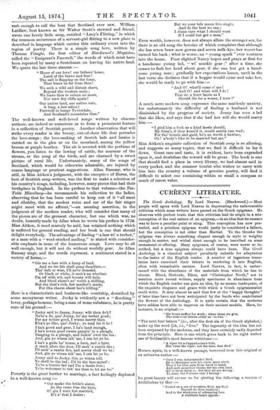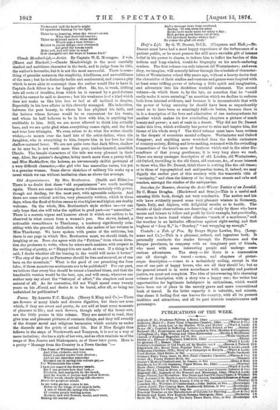CURRENT LITERATURE.
The Greek Anthology. By Lord Neaves. (Blackwood.) — Most people will agree with Lord Neaves in deprecating the unfavourable criticism which some writers have passed on the Greek epigrams. He observes with perfect truth that this criticism had its origin in a mis- conception of the real nature of an epigram,—in an idea that its essence was to have a peculiar point or sting. This conception has now pre- vailed, and a pointless epigram would justly be considered a failure, but the conception is not older than Martial. To the Greeks the epigram was always something elegant enough in style or weighty enough in matter, and withal short enough to be inscribed on some monument or offering. Many epigrams, of course, were never so in- scribed, but a true epigram always could have been. The Greek Anthology is a classical subject peculiarly suitable for adaptation to the tastes of the English reader. A number of ingenious trans- lators have exercised their talents in rendering it into English, often with remarkable success. Lord Neaves, in fact, is embar- rassed with the abundance of the materials from which he has to choose. Bland, Merivale, Elton, and "Christopher North," not to mention more recent writers, supply specimens in abundance from which the English reader can gain an idea, by no means inadequate, of the exquisite elegance and grace with which a Greek epigrammatist could write. It may almost be said that few of the "happy thoughts" of later time have not been anticipated by the bards who contributed the flowers of the Anthology. It is quite certain that the moderns have seldom been able to improve on their ancient models. Here, for instance, is an original :- "Six Six hours suffice for work; when these we give, The next four letters order us , to live.' "
"The next four letters " (i.e., after the first six of the Greek alphabet,)
make up the word i.e., "live." The ingenuity of the idea has not been surpassed by the moderns, and they have certainly sadly departed from the principle. Here is one which gives back to its right author one of Goldsmith's most famous witticisms :— "A viper bit a Cappadocian's hide, But 'Mae the viper, not the man, that died."
Horace, again, in a well-known passage, borrowed from this original of an unknown author :—
I. Once I was Achamenides' field, Fie to Menippus now his claim must yield. Thus I for ever pass from hand to hand, And each possessor thinks me his own land. Al! of them think so, but they all are wrong ; To none, but Fortune only I belong."
Its great beauty will excuse us for qttoting the following, a version of Archilochus by Hay
:- "Tossed on a sea of troubles, Soul, my Soul
Thyself do thou controul; And to the weakness of advancing foes A stubborn heart oppose ; Undaunted 'mid the hostile might Of squadrons burning for the fight.
Thine be no boasting, when the victor's crown Wins thee deserved renown;
Thine no dejected sorrow, when defeat Would urge a base retreat :
Rejoice in joyous things—nor overmuch Let grief thy bosom touch Midst evil, and still bear in mind How changeful are the ways of human kind."































 Previous page
Previous page